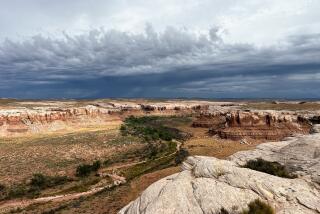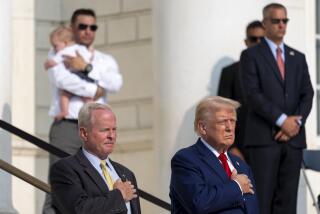Arlington Proposal Would Sacrifice Trees for Graves : Cemetery: Plans to expand graveyard anger environmentalists who want to save woods. Land transfer would require congressional approval.
WASHINGTON — A proposal by the Army to expand Arlington National Cemetery by turning part of a 24-acre stand of trees into grave sites has upset environmentalists, who say the land should be preserved.
“We take for granted that there are always more woods, more places for animals to live, and it’s just not true anymore,” said James F. Wright, an Arlington conservationist and member of the Virginia chapter of the Sierra Club. “We need to protect our natural areas where we can.”
The U.S. Park Service, which owns the land, agreed in February to allow the Army to transfer the land for grave sites once an archeological study is completed. Any transfer of the land, which is within the cemetery boundaries, would require congressional legislation.
Wright and others worry that using the parcel for graves would destroy trees, some of which predate the Civil War, and harm the historical value of nearby Arlington House, once the estate of Confederate Gen. Robert E. Lee and his wife, Mary Custis Lee.
“That 24 acres is all that’s left of the original Arlington House property,” said Maurietta (Jo) Schoolfield, who has volunteered as a guide for 15 years at the historic house. “But, my goodness, what are they going to do when the cemetery is filled up? Are they going to say, ‘Let’s tear down Arlington House so we can have more land?’ ”
Park Service and cemetery officials stress that any plan to convert the woods to graves would spare historic trees and sites.
“If part or all this land is transferred to us, we would develop this land in a very responsible nature,” said cemetery Supt. John C. Metzler Jr. “We would not come in there and completely destroy the land.”
As it is, the cemetery has more than 14,000 trees, he said. “We plant trees every year. I say that we are a very responsible steward.”
The cemetery, which has expanded seven times since it was designated by President Lincoln in 1864, is expected to run out of grave sites by 2025, Metzler said. The wooded parcel would provide burial space for 10 more years, he said. Now, 240,000 military veterans and their spouses are buried there.
A master plan being developed for the cemetery has identified 14 sites that could be used for expansion, Metzler said. Officials are considering three sites: the 24 acres; an area in adjacent Ft. Myer, which is owned by the Army; and an adjoining parcel owned by the Department of Defense, Metzler said.
The stand of trees once belonged to the Army, which transferred it to the Park Service in 1975.
Of the 24 acres to be studied, about half, called the Robert E. Lee Preservation Zone, is considered to have high historical potential, said Audrey Calhoun, the Park Service’s superintendent of George Washington Memorial Parkway, which runs Arlington House. The area also has steep slopes that make it less useful for graves.
The Park Service has yet to hire a consultant for an archeological survey of the site. Congressional review, assuming the study is favorable, likely would not take place before 1996, Metzler said.
More to Read
Sign up for Essential California
The most important California stories and recommendations in your inbox every morning.
You may occasionally receive promotional content from the Los Angeles Times.










